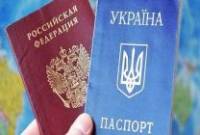Russian, or else: On how Russia is foisting its citizenship in Crimea

If a recent Russian directive is fulfilled to the letter, thousands of Crimean Tatars, ethnic Ukrainians and others who did not take Russian citizenship could in 2015 be treated as ‘foreigners’ and conceivably forced to leave the Crimea.
In its latest monitoring report, the Crimean Human Rights Field Mission highlights numerous issues regarding citizenship since Russia’s annexation of the Crimea. One of the most disturbing is the potential consequences of a Russian government directive from July 19. This establishes a quota for non-Russian residents of the Crimea (Ukrainian citizens or nationals of other countries) to receive Russian Federation temporary residence permits. Five thousand could receive such ‘permits’ for the whole of Crimea, and a further 400 for Sevastopol. The quota system is due to be enforced from the beginning of 2015.
According to information issued on a federal migration service site, people living in the Crimea on March 18 2014 who formally declared their wish to retain their Ukrainian citizenship had the right to receive a residence permit for Russia.
This should mean that they are not included in any ‘quotas’, but the Crimea Field Mission’s [CFM] assume that they are. There are also very many people who did not know that they needed to formally register their wish to retain Ukrainian citizenship within the space of one month (up till April 18), or were unable to do so. The regulations require appearance in person, and there are recorded cases of prisoners being forced to accept Russian citizenship after being unable to go to passport offices in person. The most notorious example was that of Crimean film director, abducted from the Crimea and facing absurd ‘terrorism’ charges in Russia. Moscow denied abduction claiming that Sentsov had, effectively by default, received Russian citizenship. He and the three men facing similar charges are widely believed to have been targeted because of their active (peaceful) opposition to Russia’s annexation of their native Crimea. All consciously reject Russian occupation – and Russian citizenship.
Many others did not have Crimean registration or up-to-date documents, making the 1 month deadline totally unrealistic. With the number of people waiting to register retention of Ukrainian citizenship huge, a fair number were simply unable to get to the top of the queue before April 18. This means that the 3, 500 Ukrainians who, according to the migration authorities, did not miss the deadline are quite possibly a small percentage of those living in the Crimea and not wanting to change their citizenship.
The one month deadline was unrealistic but never extended, unlike the time frame allowed to apply for Russian citizenship and reduced formal requirements for such applications.
The Russian authorities make exaggerated claims about the number of people who have received Russian citizenship and there seems to be no reliable data as to the numbers involved.
There is an enormous weight of evidence indicating the pressure that people are placed under to become Russian nationals. CFM cites widespread cases where people are threatened with dismissal, told they cannot leave the Crimea without Russian citizenship or face losing their right to land if they don’t become Russian nationals. Young people between 14 and 16 have also been affected since internal passports in Russia are issued from the age of 14, in Ukraine from 16. The Russian authorities effectively make their ability to visit friends or relatives in mainland Ukraine contingent on their receiving a Russian passport.
Moscow claimed that its annexation of the Crimea was required to defend the rights of ethnic Russians, whose rights had never, in fact, been infringed. The list of violated rights of those Crimean Tatars, ethnic Ukrainians and Russians who do not support Russia’s occupation is already formidable, and increasing all the time. Use of ‘quotas’ to force people to take on Russian citizenship is a gross infringement of their rights, as will be any application of restriction against Ukrainian nationals living in Crimea.





